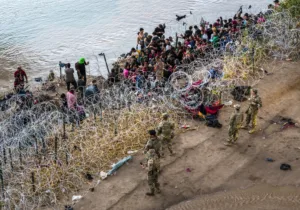In 2016, before Donald Trump’s inauguration, United Nations Secretary-General Antonio Guterres relayed a powerful message. He stated:
In the end, it comes down to values. We want the world our children inherit to be defined by peace, justice, respect, human rights, tolerance, and solidarity. All major religions embrace these principles, and we strive to reflect them in our daily lives. But the threats to these values are most often based on fear. Our duty to the peoples we serve is to work together to move from fear of each other, to trust in each other. Trust in the values that bind us, and trust in the institutions that serve and protect us.
This call to remember things of lasting importance contained several powerful sentiments, but arguably the most important amidst today’s political climate is the idea that values are often threatened by fear. Guterres called for fostering trust over fear. There are few messages currently more relevant to the United States.
In the time it takes you to read this sentence, another four people in the world will be displaced as a result of persecution, conflict, violence, or human rights violations. In the developed world, this reality all too often gets brushed aside and accepted simply as a shocking statistic. While a select few may have the luxury of never directly dealing with the global refugee and resultant immigration crises, a majority of people worldwide will be affected, both directly and indirectly. The very nature of the crises makes it more than an issue for those being forced to leave their livelihoods. Because one in every 120 people worldwide is either an asylum seeker, internally displaced person, or a refugee, there is an increased pressure placed upon other countries to provide safe spaces. Given this, it is no surprise that within the last decade the conversation in the United States surrounding both refugees and immigration has become more common and more contentious.
In the US over a century ago, not long after the Statue of Liberty was dedicated, a plaque with the following sentiment was cast in bronze and mounted at its base—offering a promise of hope to all immigrants. The plaque reads, “Give me your tired, your poor, / Your huddled masses yearning to breathe free, / The wretched refuse of your teeming shore. / Send these, the homeless, tempest-tost to me, / I lift my lamp beside the golden door!” Our nation appears to have forgotten this message. In approaching the issue of immigration, it is all too easy to disregard the human component of the question. The United States has become so immersed in the politics and policy of immigration that it has forgotten the human component, the immigrant within the crisis. The US must reexamine its values, and remember its heritage of trust. Only if it holds itself to its historical standard can it hope to be effective and provide any aid in this global crisis.
In the past decade—particularly in the last two years—the pattern the United States has set has only further cultivated a message of apathy toward the plights of others. Immigrants have become scapegoats for an ever-increasing range of problems plaguing the United States—accused of everything from being at the root of unemployment, growing crime rates, and the falling global status of the nation. There are undeniably problems stemming from immigration in the United States, but the greater issue that pervades this conversation lies in how America has failed to demonstrate due compassion in approaching such a pressing matter. In the political climate that continues to arise under the Trump administration, polls show that four in 10 Americans support his promised wall along the US-Mexico border, and even more approve of the travel ban on citizens from nine terror-linked countries. With a growing “America First” sentiment and resultant actions stemming from such an ideology, it is evident that Americans have strayed not only from moral obligations as people and as a nation, but more tragically from our very founding ideals as a country. This pervasive fear and hate toward the “other” has resulted in selectively attending to those in need, and this same dangerous US passivity has also sent a message of desiring disconnect from the larger global community.
To gain a true appreciation for just how much more isolationist and anti-immigrant American policies have become over these past two years, it is helpful to examine all that has occurred under the Trump administration. On a large scale, the US has withdrawn from the United Nations Human Rights Council and proposed massive cuts to UNHCR’s humanitarian response efforts. While the subsequent effects upon each organization are negotiable, the larger reality is that the United States is beginning to willingly hand over its role as a strong global contributor and as a nation willing to respond to the plights of those seeking assistance. The initiatives directly relating to immigration are even more startling. The overt discrimination, particularly directed at those coming from the Middle East, began early on in Trump’s presidency. He began his first term by invoking the Muslim Ban which blocked anyone from some Muslim-majority countries including Yemen, Iran, Libya, Chad, Somalia, and Syria from entering the United States. While the ban was introduced from a protectionist perspective, more than helping to safeguard the US from danger, it propagated a message of fear and an utter lack of trust. It affirmed the idea that by simply excluding the demonized “other” the US would be better off.
In line with the theme of blatant discrimination set during the first months of 2017, over the past year immigration admission caps, the maximum number potentially allowed to enter, have been cut by almost half their prior allowances. This reduction is stark, but the raw numbers of those ultimately permitted to enter the United States have also been cut by an additional 50 percent—resulting in an overall decrease of 75 percent in immigrants entering the country this past year. While one may argue that this reduction was merely an attempt at stemming immigration altogether, when examining more thoroughly, it becomes clear that the number of Europeans admitted has grown over the past year. Only a reduction among non-Europeans has taken place. This reduction in admitted individuals has dishearteningly not affected all equally. As if these iniquitous realities were not jarring enough, deportation and the reopening of cases long closed has been on the rise. Given all of these shifts toward a more exclusionary and xenophobic nation, it is not altogether surprising that in 2018 the refugee resettlement program resettled in the smallest number of refugees since its establishment in 1980.
As it is a global crisis, immigration and the topic of refugees are not topics solely affecting the United States. Outside of the US, countries have taken varied approaches to contend with the urgent humanitarian crisis. While there are innumerable approaches available to analyze, in shifting our gaze specifically toward Jordan in relation to the Syrian refugee crisis, one can gain a holistic view of how far the US has to go in reinventing how our nation approaches those seeking our assistance.
Sharing a border with Syria, Jordan has become heavily burdened with Syrian refugees over the past decade. To be specific, Jordan is among one of the countries, if not the sole country, with the highest ratio of registered refugees to overall population in the world. The number of Syrians pouring into Jordan far outweighs any statistics of those attempting to enter the United States. Yet while there are still negative sentiments toward Syrians within Jordan, Jordanians have not fostered the same message of demonizing hate that the US has so successfully cultivated. In contrast, many policymakers have noted that Jordan might be a promising example of how a country can approach the refugee crisis. By no means is the structure in Jordan perfect or even sustainable, but it has been continually described as “warm and very accommodating.” Bryn Boyce, deputy director of programs and acting country director in Jordan for the International Rescue Committee, even noted that although the burden upon the countries of refugees is increasing, the majority of Jordanians still desire to accept refugees. This is drastically different from current sentiments within America, and it is in this very reality that the pertinent message is again recognized: America must place a higher value upon humanity.
While there is undebatable merit in valuing and prioritizing the interest of one’s nation, this is not a mutually exclusive endeavor. A nation can value its own people while still placing worth in human life across the board. To disregard the complexity of the issue of immigration and the refugee would be naive. Specific, researched, and thoroughly debated policy surrounding such issues are all arguably indispensable. That said, to think solely in these terms is ultimately ineffective. The United States must commence with a dialogue governed by acknowledging the human component of the issue. It is through integrating policy approaches with the necessitated human component that the US fulfills some of its many ideals.
No matter the spin that is put on the issue of immigration, the reality of history remains: as Americans, we automatically inherit a story intricately woven with the strand of truth that we are a part of a nation that was never ours to begin with. If we suddenly view it as our prerogative to deny others the opportunity to create a story of freedom and more devastatingly demonize all those who struggle to write this narrative for themselves, we fail. This failure is not only in terms of our moral obligation as Christians to love those around us, but also in fulfilling the ideals set out by our nation to provide a space for the “tired,” the “poor,” and most importantly the “homeless.”
Sources
Betts, Alexander, and Paul Collier. Refuge: Rethinking Refugee Policy in a Changing World. (Oxford University Press, 2017).
Dwyer, Colin. “U.S. Announces Its Withdrawal From U.N. Human Rights Council.” NPR, June 19, 2018, npr.org.
“Immigration Data & Statistics.” Department of Homeland Security, April 9, 2019, dhs.gov.
Kelberer, Victoria. “Negotiating Crisis: International Aid and Refugee Policy in Jordan.” Middle East Policy, vol. 24, no. 4, 2017, pp. 148–165., doi:10.1111/mepo.12313.
Krogstad, Jens Manuel, et al. “5 Facts about Illegal Immigration in the U.S.” Pew Research Center, Pew Research Center, November 28, 2018, pewresearch.org.
“Refugee Statistics.” USA for UNHCR, unrefugees.org.
“Religious Leaders on Immigration Reform.” Council on Foreign Relations, Council on Foreign Relations, www.cfr.org/expert-roundup/religious-leaders-immigration-reform.
“Trump’s Attacks on the Legal Immigration System Explained.” American Friends Service Committee, March 22, 2019, afsc.org.
Zong, Jie, et al. “Frequently Requested Statistics on Immigrants and Immigration in the United States.” Migrationpolicy.org, April 15, 2019, migrationpolicy.org.






 Sponsor a student for Christianity & National Security 2024
Sponsor a student for Christianity & National Security 2024